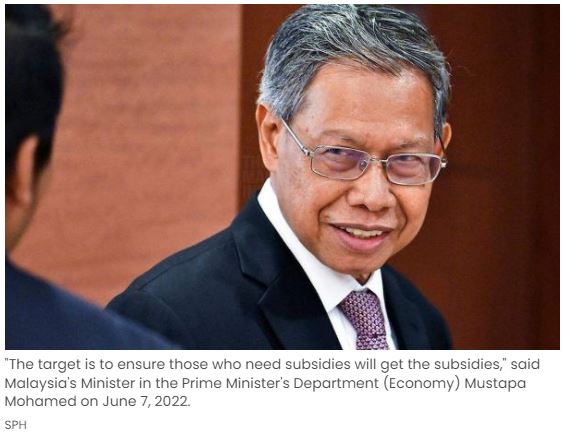Targeted subsidies for fuel, cooking oil in the works: Malaysia’s Economy Minister
Malaysia has begun work on replacing its blanket petrol and cooking oil subsidies with a more targeted approach, as government spending rises to blunt higher living costs.
“The target is to ensure that those who need subsidies, will get the subsidies,” Minister in the Prime Minister’s Department (Economy) Mustapa Mohamed said in an interview with Bloomberg TV on Tuesday (June 7). “The sooner it is done, of course, it will relieve pressure on the government’s budget.”
Unanticipated subsidies is expected to push the government’s total spending in 2022 “significantly higher” by about RM30 billion (S$9.41 billion), the Finance Ministry said last Friday, adding that the higher revenue from rising commodity prices was insufficient to offset the spike. The extra funds were mainly for petrol, chicken and egg subsidies as well as flood reliefs, it added.
Prime Minister Ismail Sabri Yaakob said on Monday that the final subsidy bill this year could breach RM71 billion.
Malaysia’s inflation rate is expected to slightly increase, yet remain within the forecast range of 2.2 per cent to 3.2 per cent in 2022, Mustapa said. Consumer prices rose by a modest 2.3 per cent in April, while the core measure that strips volatile food and energy costs gained 2.1 per cent.
The rising prices correspond with Malaysia’s economic recovery. Gross domestic product gained speed in the first quarter of this year, as the country dropped most virus-related restrictions. That allowed the central bank room to raise borrowing costs last month to preemptively fight inflation, even though consumer prices are gaining at the slowest rate in South-east Asia.
Bank Negara Malaysia estimates the economy to quicken anywhere between 5.3 per cent and 6.3 per cent in 2022 from a year ago, a forecast that Mustapa reaffirmed. “This is premised on, of course, good growth in the first quarter of 2022 of 5 per cent,” he said.
“The first few months of the second quarter, particularly in April and May look promising. So, first half we are going to do well, and for the full year as a whole, we remain optimistic that 5.3 per cent to 6.3 per cent is achievable as highlighted by our central bank.” BLOOMBERG


 English
English




